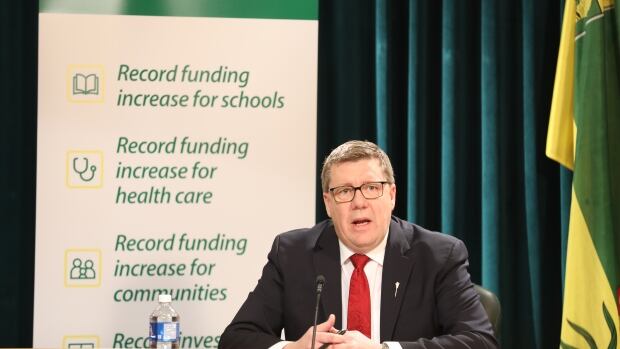
Why Sask. is touting record spending in its budget and why that claim needs context
CBC
The Saskatchewan government has tabled its 2024-25 budget, which features a $273.2-million projected deficit and one key message: record investment in multiple areas.
Finance Minister Donna Harpauer said it repeatedly in her news conference on the budget.
"This year's budget makes record new investment in classroom, care and communities," Harpauer said.
Premier Scott Moe attempted to hammer home that message even further during his own news conference.
Moe sat in front of a banner that displayed the phrases "Record funding increase for schools," "Record funding increase for health care" and "Record funding increase for communities."
The claims are true. Take the $7.6 billion the province is putting toward the Ministry of Health. That's up from $6.9 billion in last year's budget.
The Ministry of Education — which administers pre-K-12 schools, early learning, child care and libraries — will receive $3.3 billion. That's an increase of $247.8 million from the 2023-24 budget.
But experts say these statements deserve some context.
Haizhen Mou, a professor at the Johnson Shoyama Graduate School of Public Policy, said the Saskatchewan Party made a "bold" decision to increase spending, despite only a 0.9 per cent or $184.2 million increase to its revenue.
"This is a historically high amount of spending on everything: health care, education, and the capital [budget]," Mou said.
"However, considering inflation and also population growth, this is kind of normal."
Inflation means that everything is getting more expensive. Combined with a growing population, this means the province has to spend more just to provide the same services.
So with "record" spending perhaps not being as dramatic as it was painted by the province, why put so much focus on it?
The experts CBC spoke with say touting the claim is one way to add some juice to a budget that is generally pretty "boring."





















 Run 3 Space | Play Space Running Game
Run 3 Space | Play Space Running Game Traffic Jam 3D | Online Racing Game
Traffic Jam 3D | Online Racing Game Duck Hunt | Play Old Classic Game
Duck Hunt | Play Old Classic Game











